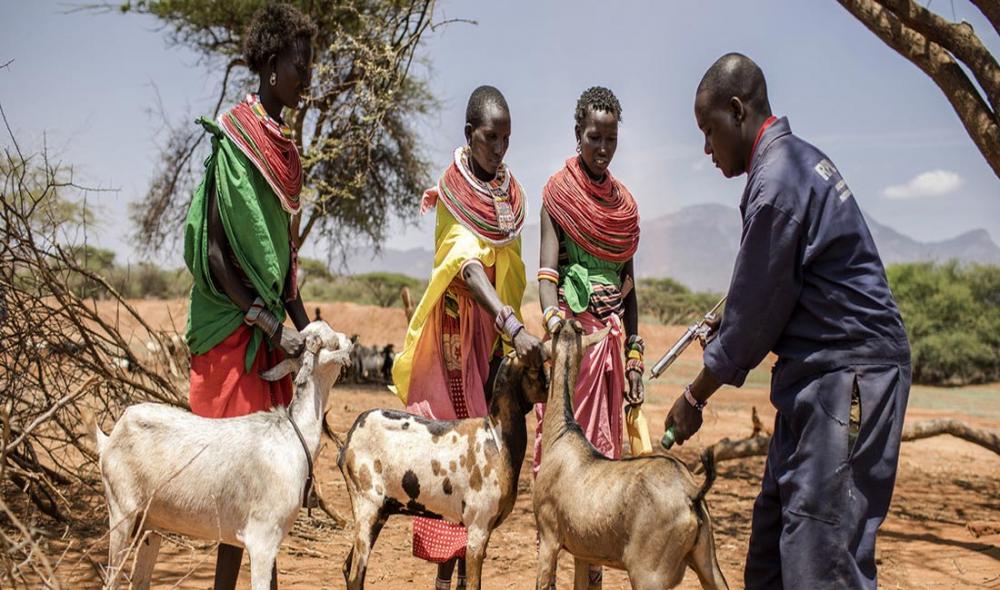Just Earth News | @JustEarthNews | 10 Sep 2018, 06:20 pm Print

FAO/Luis Tato
New York, Gathered at a major United Nations agricultural conference, over 45 countries today pledged to eradicate by 2030 a highly contagious and devastating disease responsible for the death of millions of small farm animals, at cost of more than $2 billion each year.
Controlling and eventually eradicating the Peste des petits ruminants (PPR) disease – which has nearly 90 per cent fatality rate among the animals it infects – will also strengthen food security and nutrition, improve resilience of pastoralists, as well as contribute to the implementation of the 2030 Agenda for Sustainable Development, said the UN Food and Agriculture Organization (FAO).
“Small ruminants are the primary livestock resource of about 300 million poor rural families in developing and emerging countries … Eradicating PPR is fundamental for building a safer and more sustainable world,” highlighted the agency’s Director-General, José Graziano da Silva.
Organized jointly by the FAO and the World Organisation for Animal Health (OIE), and hosted by the European Commission in Brussels, the conference also called on the international development community to contribute to the PPR Global Eradication Programme to bridge its $340 million funding gap.
In spite of the very high fatality rate, PPR is easily preventable with inexpensive vaccines that can be administered at low cost.“The financial resources to eradicate PPR are not an expense, but an important investment that will result in future economic and social gains,” added Mr. Graziano da Silva.
Since its initial identification in Côte d’Ivoire in 1942, PPR – also known as the ‘goat plague’ – has spread to over 70 countries in Africa, Middle East, and Asia and has reached new areas in recent years.
According to the OIE, PPR is caused by the morbillivirus in the family of paramyxoviruses, that is related to rinderpest, measles and canine distemper. The virus is not known to affect humans.
In December 2016 the first reported outbreak in sheep and goats with spill-over of the disease to a wild antelope species was observed in Mongolia, and later in June 2018, it reached the European Union, with a first-ever case reported in Bulgaria.
African Swine Flu outbreaks ‘almost certain’ in Asian countries
Meanwhile, the outbreak of the African Swine Flu (ASF) in China, first detected last month by authorities there, is reported to be accelerating and will almost certainly emerge in other countries in Asia, an FAO regional emergency meeting heard on Friday.
In response, China and FAO have been working together and have helped veterinary authorities and others respond quickly and isolate areas where ASF detections have occurred and to date, nearly 40,000 infected animals have been culled in efforts to limit the spread.
The emergency meeting, convened by FAO in Bangkok, saw veterinary authorities and other key stakeholders from 12 countries, ASF experts, and OIE representatives form a specialized regional network that has pledged to respond aggressively and collaboratively when new outbreaks occur anywhere in the region.“The Chinese authorities have taken this outbreak very seriously and have been very proactive in sharing information and their lessons learned with FAO and neighbouring countries about the spread of the virus and their actions so far,” said Wantanee Kalpravidh, FAO’s Asia Regional Manager of its Emergency Centre for Transboundary Animal Diseases.
“This cross-border, regional collaboration is vital in responding to this very real threat to Asia’s swine sector, because this isn’t something that Ministries or Departments of Agriculture can handle on their own,” said Kundhavi Kadiresan, FAO Assistant Director-General and Regional Representative for Asia and the Pacific.
“This virus is a threat to livelihoods, to economies, to an entire industry and its associated value chains. So everyone needs to pay attention to this and step up, in a coordinated way, to take on this challenge. FAO will continue to help with that.”
- Why are scientists warning about surging glaciers? All details inside
- Mass coral bleaching to hit Great Barrier Reef most years, study reveals
- Global water bankruptcy shock: Why the planet’s most precious resource Is collapsing
- Would you pay $1 million to stay on the moon? This company thinks so
- A historic UN deal is about to transform how the world protects its oceans





-1763561110.jpg)
